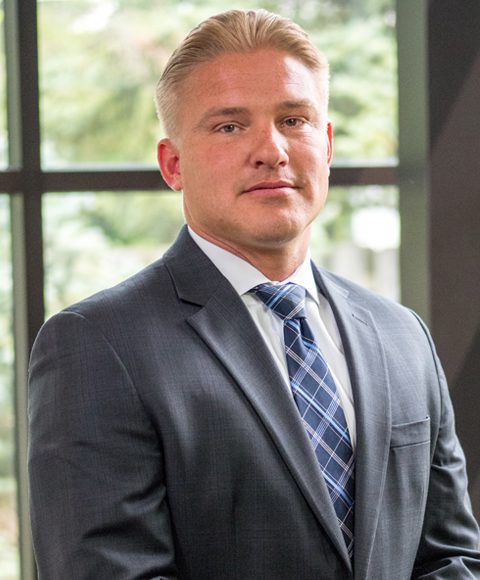 Anthony Kuhn took an unconventional approach to finding his first full-time position as an attorney.
Anthony Kuhn took an unconventional approach to finding his first full-time position as an attorney.
While many soon-to-be graduates of law school blanketed a variety of firms with letters and resumes hoping to be interviewed and eventually hired, he targeted just one firm: Tully Rinckey.
Believe it or not, this is the only firm I ever applied to,” said Kuhn, a 2015 graduate of the University at Buffalo School of Law. “I decided this was the place where I would fit in. This was the place I was going to work, whatever it took.”
His research showed that the Albany-based firm with an office in Buffalo was proficient in military law. A 20-year member of the military himself, he also spoke with fellow service members who had been represented by Tully Rinckey.
So Kuhn looked up the email address of co-founder Mathew Tully, sent him a message along with his resume and within a week had an interview scheduled with co-founder Greg Rinckey. Tully and Rinkey are military veterans.
During the interview in Rinckey’s office, Kuhn saw some military mementos which helped put him at ease. The interview went well, and a few weeks later Kuhn was offered a position as an associate.
“Behind Mr. Rinckey, over one of his shoulders in his office, was a rifle stack,” said Kuhn, who spent six years as an Army drill sergeant and seven years as a First Sergeant of a combat engineer drill sergeant company. “I knew right then and there that I probably made the right choice. We had a very good discussion.”
Now, after just two years at the firm, he has been named managing partner in Buffalo. His practice focuses on military law and national security, but his main role is overseeing the daily operations of a team of six attorneys, four paralegals and six support staff.
Kuhn’s military experience played a role in his promotion, according to Tully. He and Rinckey started the firm in 2004 and say they have been successful because of the ability to incorporate their training into how the law is practiced. So when they look for other lawyers to advance, military experience can be critical.
Tully said he expects Kuhn to cultivate a good working environment and effectively lead the staff.
“His military leadership was in the forefront of our minds (when we made this decision),” Tully said. “His experience as being a first sergeant of a company, which has hundreds of soldiers, is an example of how he mentors and helps individuals advance in their careers. Leadership is less contingent on having the technical skills but having the broad overview of skills to motivate somebody to go from point A to B.”
Kuhn nearly didn’t take this path to Tully Rinckey. In law school, he said he realized that there were many soon-to-be attorneys out there and not enough jobs, so he aspired to do something to stand out.
He decided to remove his military experience from his resume so that he would be taken more seriously as a legal professional. He worked hard to get some experience, taking an internship at the Erie County District Attorney’s Office, an externship at a Wheatfield attorney’s office and serving as assistant chief of the Hearing Department at the University at Buffalo.
During that time he worked several part-time jobs to provide for his wife and three sons.
However, a conversation with law professor Patrick Long, a former naval officer, resonated most with Kuhn. Long told him to find a niche practice that would make him valuable to a firm. That changed the way Kuhn viewed his military experience and he decided to use it as leverage to find a job.
Long also told him to make time to give back to the community, and now Kuhn is in a position to do so by representing soldiers in matters against the government. He became an accredited VA attorney, is admitted to the Court of Claims for Veterans Appeals in Washington, D.C., as well as U.S. Court of Federal Claims and the Air Force, Marine Corps, Navy and Armed Forces Criminal Court of Appeals. In addition, he has pending admission to the Army Criminal Court of Appeals.
Most of his clients are military veterans and federal agents and employees.
“He told me that if you develop a niche, you’ll never be hurting for a job,” Kuhn said of the advice he received from Long. “After that conversation, I re-evaluated and thought to myself, ‘Why am I worried about knocking military off my resume?’ I have experience that I think 98 percent of the population won’t even have and even a greater number than that if you consider I have been doing it for 20 years.”
A 1996 graduate of North Tonawanda High school, he was in a hurry to get into the military and fulfill a childhood aspiration. So at 17 he enlisted and later celebrated his 18th birthday in basic training in Fort Knox, Ky.
He spent the first four years of active duty as an Army Tanker, then came home with plans to end his military career. But a month later, he met a recruiter who offered him a chance to become a drill sergeant. He went into the reserves to attend drill sergeant school and then spent seven years as an Army drill sergeant. He was mobilized to Iraq and served as an intelligence adviser to the First Brigade of the New Iraqi Army.
He was part of an invasion of Fallujah in 2004 and helped develop the first reconnaissance and surveillance teams for the New Iraqi Army.
Kuhn returned to Buffalo in 2005 and went on to earn a bachelor’s degree. He considered a few different careers, including working for Customs and Border Protection or the Buffalo Police Department. But he figured there would be more job security if he went to law school or medical school. Once he took the LSAT and did well, Kuhn decided that law would be the best fit and he enrolled at the UB School of Law.
While in the military, people often told him he’d make a good attorney.
“I don’t have a problem getting up and making noise,” he said. “I have never had an issue with advocating for my soldiers. I look forward to opportunities to advocate for my clients.”
At Tully Rinckey, he hit or exceeded most of his goals from the start. As someone who trained soldiers and colleagues in various countries, he became an ideal managing partner candidate for the four-year-old local office.
“It was determined based on my military experience and my early success in the legal field that this position would be offered to me and I happily accepted,” Kuhn said.
The Buffalo office has experienced some turnover in managing partners since the 2013 opening, but Tully expects Kuhn to be there for many years.
Tully said that whenever his firm sets up shop in a new geographical area — Tully Rinckey has seven offices, including five across New York state — it experiences some turnover and there often is change in the managing partner position.
“When we go into new markets, we try to internally hire,” Tully said. “And sometimes whether the people think they can do a great job or can’t or whether we make a bad decision, there has traditionally been turnaround in many of our spots.”
Kuhn lives by the drill sergeant’s creed: “I’ll never ask any solider to attempt any task that I wouldn’t do myself.”
He said that won’t be any different in his new position at the firm.





